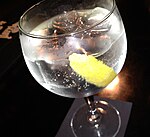List of hot drinks
Appearance
(Redirected from List of hot beverages)
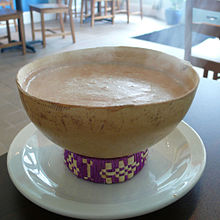
This list of hot drinks comprises drinks that are typically served hot. Drinks are liquids specifically prepared for human consumption.
Hot drinks
[edit]| Name | Image | Origin | Description |
|---|---|---|---|
| Aleberry | Made by boiling ale with spice (such as nutmeg), sugar and bread-sops, the last commonly toasted. It is sweetened, strained, and drunk hot. | ||
| Anijsmelk | Dutch drink, consisting of hot milk flavored with anise seed and sweetened with sugar | ||
| Apple cider | 
|
Popular fall (autumn) and winter beverage[1]
| |
| Asiático | 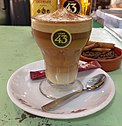
|
Popular hot drink from Cartagena, Spain, consisting of coffee with condensed milk and cognac.[2] | |
| Atole | 
|
Traditional masa-based hot corn based beverage of Mexican and Central American origin, where it is known as atol
| |
| Bajigur | Hot and sweet beverage native to the Sundanese people of West Java, Indonesia. The main ingredients are coconut milk and Aren palm sugar; usually to add taste, a small amount of ginger and a small pinch of salt. | ||
| Bandrek | 
|
West Java, Indonesia | Traditional hot, sweet and spicy beverage native to Sundanese people of West Java, Indonesia.[3] It's a mixture of jahe (ginger) essence, gula merah (palm sugar) and kayu manis (cinnamon).[3] |
| Blackberry demitasse | Cocktail made from blackberry brandy or liqueur, blackberry jelly, cognac, water and lemon juice. It is served hot in a demitasse with a slice of lemon.[4] | ||
| Blue Blazer | 
|
Flaming cocktail made from Scotch or Irish Whiskey, honey, boiling water and lemon peel. It is served steaming hot for slow sipping.[4] | |
| Bouillon | 
|
Includes clam, tomato, oyster, chicken, asparagus bouillon and others, served at soda fountains in the United States in the early 1900s.[5] Food extracts such as beef extract were also used to prepare beef-flavored drinks add flavoring to other drinks at U.S. soda fountains during this time.[5] The beef variety was sometimes referred to as "beef tea".[6] Olives were often used in these bouillon drinks and those that were salty.[5]
| |
| Butter tea | 
|
Tibet | Also known as po cha, a drink of Tibet, Nepal, Bhutan, and Buddhist minorities in India, made from tea leaves, yak butter, water, and salt. Drinking butter tea is a regular part of Tibetan life. Before work, a Tibetan will typically enjoy several bowlfuls of this beverage, and it is always served to guests. Nomads are said to often drink up to 40 cups of it a day. Since butter is the main ingredient, the drink provides plenty of caloric energy and is particularly suited to high altitudes. The butter may also help prevent chapped lips. |
| Cannabis tea | 
|
A cannabis-infused drink prepared by steeping various parts of the cannabis plant in hot or cold water. | |
| Caudle | 
|
British thickened and sweetened alcoholic hot drink, somewhat like eggnog. It was popular in the Middle Ages for its supposed medicinal properties. | |
| Coffee | 
|
There are several accounts of the historical origin of coffee.
| |
| Hot egg drinks[5] | Phosphate soda and beverages were made with fruit flavorings, egg, malt, or wine. They became popular among men in the 1870s in the United States, and in the 1900s, the beverages became popular with both men and women. Fruit-flavoured phosphate sodas were served at soda fountains, before losing popularity to ice cream beverages in the 1930s.[7] | ||
| Espresso | 
|
Coffee brewed by forcing a small amount of nearly boiling water under pressure through finely ground coffee beans. Angelo Moriondo's Italian patent for a steam-driven "instantaneous" coffee beverage making device, which was registered in Turin in 1884 (No. 33/256), is notable. Author Ian Bersten, whose history of coffee brewers is cited below, claims to have been the first to discover Moriondo's patent.[9] Bersten describes the device as "... almost certainly the first Italian bar machine that controlled the supply of steam and water separately through the coffee" and Moriondo as "... certainly one of the earliest discoverers of the expresso [sic] machine, if not the earliest." The term espresso, substituting s for most x letters in Latin-root words, with the term deriving from the past participle of the Italian verb esprimere, itself derived from the Latin exprimere, means 'to express', and refers to the process by which hot water is forced under pressure through ground coffee.[10][11] Types of espresso drinks include:
| |
| Hot ginger cordial | Served at U.S. soda fountains in the early 1900s[5] | ||
| Greyana rakiya | 
|
Boiled rakiya; a winter alcoholic beverage in Bulgarian cuisine prepared with grape or plum brandy and honey[12] | |
| Grog | 
|
Refers to a variety of alcoholic beverages. Modern versions are often made with hot or boiling water, and sometimes include lemon juice, lime juice, cinnamon or sugar to improve the taste. Rum with water, sugar, and nutmeg was known as bumbo and was more popular with pirates and merchantmen. | |
| Herbal tea | 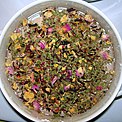
|
Any beverage made from the infusion or decoction of herbs, spices, or other plant material in hot water, and usually does not contain caffeine.[13] These drinks are distinguished from true teas that are prepared from the cured leaves of the tea plant, Camellia sinensis. | |
| Hot buttered rum | 
|
Mixed drink containing rum, butter, hot water or cider, a sweetener, and various spices, usually cinnamon, nutmeg, and cloves | |
| Hot chocolate[8][14] | 
|
Also known as hot cocoa, it typically consists of shaved chocolate, melted chocolate or cocoa powder, heated milk or water, and sugar. Hot egg chocolate is a type of hot chocolate.[5][8] | |
| Hot toddy | 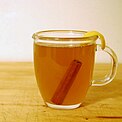
|
Mixed drink made of liquor and water with sugar and spices and served hot.[15] | |
| Irish coffee | 
|
Cocktail consisting of hot coffee, sugar and Irish whiskey, topped with thick cream | |
| Hot lemonade[8] | 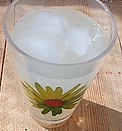
|
Claret lemonade is a type of hot lemonade[8] | |
| Yulmu-cha | In Korea, a thick drink called yulmu cha (율무차, literally "Job's tears tea") is made from powdered Job's tears. | ||
| Malted milk[5][6][8] | 
|
Powdered gruel made from a mixture of malted barley, wheat flour, and whole milk, which is evaporated until it forms a powder. Brands of malted milk include:
| |
| Mate cocido | 
|
Infusion typical of Southern Cone cuisine (mostly consumed in Southern Brazil, Argentina, Paraguay and Uruguay). It is traditionally prepared by boiling yerba mate in water, then strained and served in cups. | |
| Mulled wine | 
|
Usually made with red wine along with various mulling spices and raisins. Wine was first recorded as spiced and heated in 1st century Rome.[citation needed]
| |
| Posset | 
|
British hot drink of milk curdled with wine or ale, often spiced, which was popular from medieval times to the 19th century. It was typically prepared with milk that was heated to a boil, then mixed with wine or ale, which curdled it, and the mixture was usually spiced.[16] | |
| Postum | 
|
Roasted grain beverage that was popular as a coffee substitute during World War II. | |
| Rüdesheimer Kaffee | 
|
Alcoholic coffee drink from Rüdesheim am Rhein in Germany invented in 1957 by the German television chef, Hans Karl Adam.[17] | |
| Sake | 
|
Traditional Japanese beverage which is produced from fermented rice and may be served hot | |
| Salep | 
|
Turkish beverage made of tubers of some Orchid species. Also known as sahlep. Served with cinnamon and sometimes mahlep. | |
| Sassafras tea | 
|
Tastes much like root beer but was traditionally drank hot or cold in the southern United States.[18] | |
| Smoking bishop | 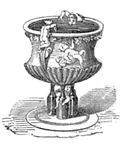
|
Type of mulled wine punch or wassail that was especially popular in Victorian England at Christmas time | |
| Soda | 
|
Historically, hot sodas were served at soda fountains[5][6][8] | |
| Spiced punch[14] | 
|
Spiced punch served hot | |
| Tea[14] | 
|
The exact inventor of tea is unknown, but Chinese legends attribute the invention of tea to Shennong in 2737 BC.[19] Pictured is a cup of Earl Grey black tea.
| |
| Wedang Jahe | 
|
Indonesia | An Indonesian ginger tea |
Indonesia
[edit]India
[edit]There are many hot beverages that originated from India that have gained popularity in other countries. For example, chai[21] (also known as masala chai) is a spiced milk tea that has become very popular throughout the world. Coffee also became a popular hot beverage in India, especially filtered coffee.



See also
[edit]- Coffee culture
- Coffeehouse
- Coffee service
- Drinking
- International Coffee Day
- Tea culture
- Tea house
- List of beverages – categorically organized article along with information about primary topics and list article links
- List of Chinese teas
- List of chocolate beverages
- List of coffee beverages
- Lists of beverages – index of beverage list articles on Wikipedia
References
[edit]- ^ "Warm Up With Mulled Wine & Cider".
- ^ García Jiménez, Raúl (18 de febrero de 2010). "Historia y receta del café asiático". A fuego lento
- ^ a b Yuli Tri Suwarni (22 April 2005). "Bandung a haven for snack-lovers and shoppers". The Jakarta Post. Archived from the original on 21 August 2014. Retrieved 20 August 2014.
- ^ a b Mario, Thomas. Playboy bartender's guide, 1971. p. 277.
- ^ a b c d e f g h American Druggist and Pharmaceutical Record, Volume 55. American Druggist Publishing Company. 1909. pp. 287–288.
- ^ a b c Bulletin of Pharmacy, Volume 17. 1903. p. 27.
- ^ Andrew F. Smith (6 March 2007). The Oxford companion to American food and drink. Oxford University Press US. pp. 478–. ISBN 978-0-19-530796-2. Retrieved 1 April 2011.
- ^ a b c d e f g h The Northwestern Druggist: A Progressive Journal for Retail Druggists, Volume 14. 1913. pp. 45–48.
- ^ Bersten, p. 105
- ^ "Qual è il caffè espresso perfetto e come va bevuto?" (in Italian). Retrieved 13 June 2022.
- ^ "Is it espresso or expresso? Yes". Merriam-Webster. Retrieved 18 July 2023.
- ^ Stavreva, Kirilka (1997). Bulgaria. M. Cavendish. p. 118. ISBN 0761402861.
- ^ "Herbal tea at Dictionary.com". Dictionary.reference.com. Retrieved 4 May 2014.
- ^ a b c Heiss, Mary Lou; Heiss, Robert J. (2013). Hot Drinks. Ten Speed Press. ISBN 978-1607745600.
- ^ "Definition of Hot Toddy". Princeton WordNet. Retrieved 12 February 2012.
- ^ Hieatt and Pensado 1988, Item 130.
- ^ Rüdesheimer Kaffee[permanent dead link] Ruedesheim.de. Retrieved: 20 November 2012.
- ^ The Foxfire Book of Appalachian Cookery p. 43.
- ^ Yee, L. K., Tea's Wonderful History, The Chinese Historical and Cultural Project, archived from the original on 3 August 2002, retrieved 17 June 2013,
year 1996-2012
- ^ HP Melati (2008). The Magic of Tea (in Indonesian). Jakarta: Hikmah. pp. 59–60. ISBN 9789791142564.
- ^ Chai
 This article incorporates text from a publication now in the public domain: Ward, Artemas (1911). "The Grocer's Encyclopedia - Wikipedia". The Grocer's Encyclopedia.
This article incorporates text from a publication now in the public domain: Ward, Artemas (1911). "The Grocer's Encyclopedia - Wikipedia". The Grocer's Encyclopedia.
Bibliography
[edit]- Constance B. Hieatt; Eulalia Pensado (1988). An Ordinance of pottage: an edition of the fifteenth century culinary recipes in Yale University's Ms Beinecke 163. Prospect Books and Beinecke Rare Book and Manuscript Library. ISBN 978-0-907325-38-3.
External links
[edit]Wikimedia Commons has media related to Hot drinks.
- "Hot Drinks in Malaysia" (report). Euromonitor International. June 2014. (subscription required)










